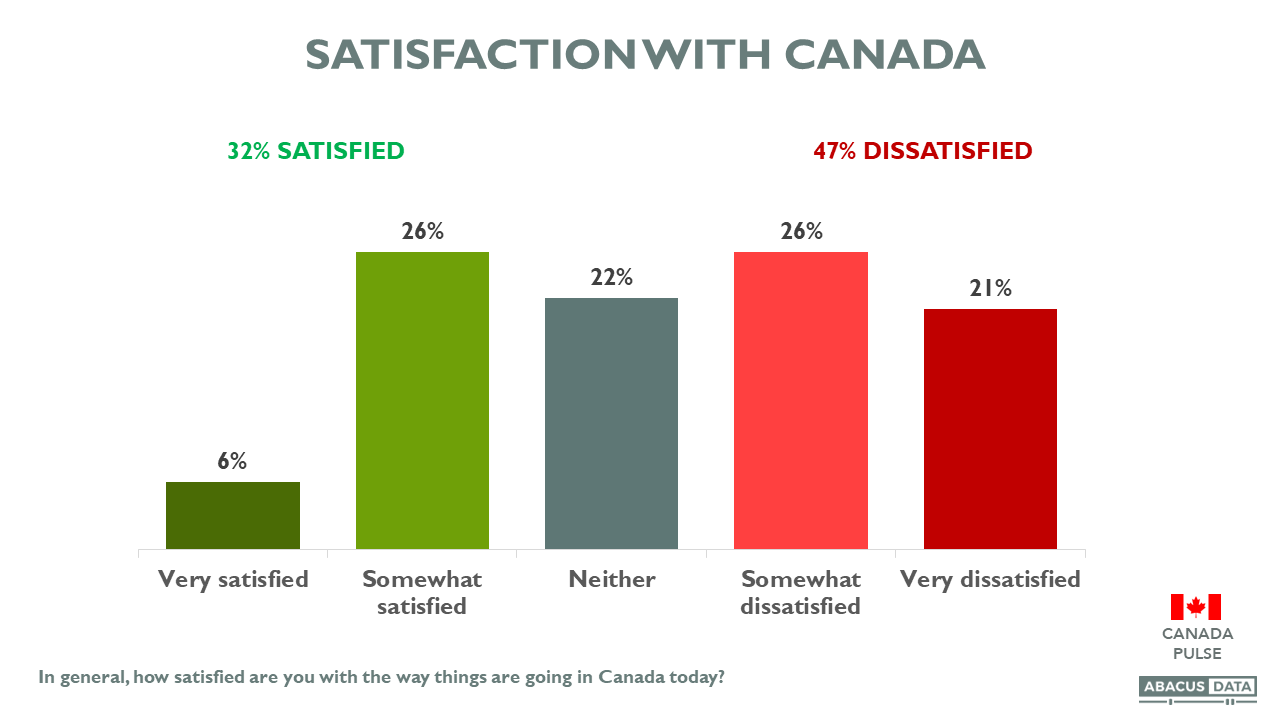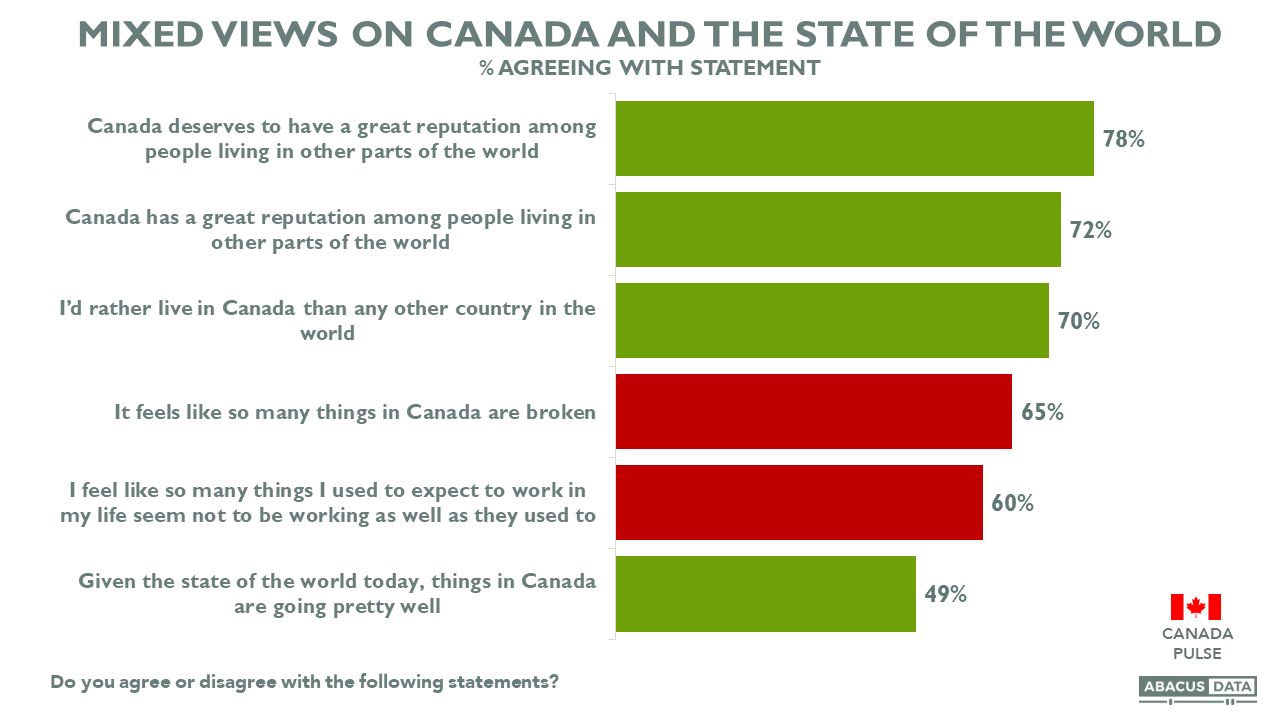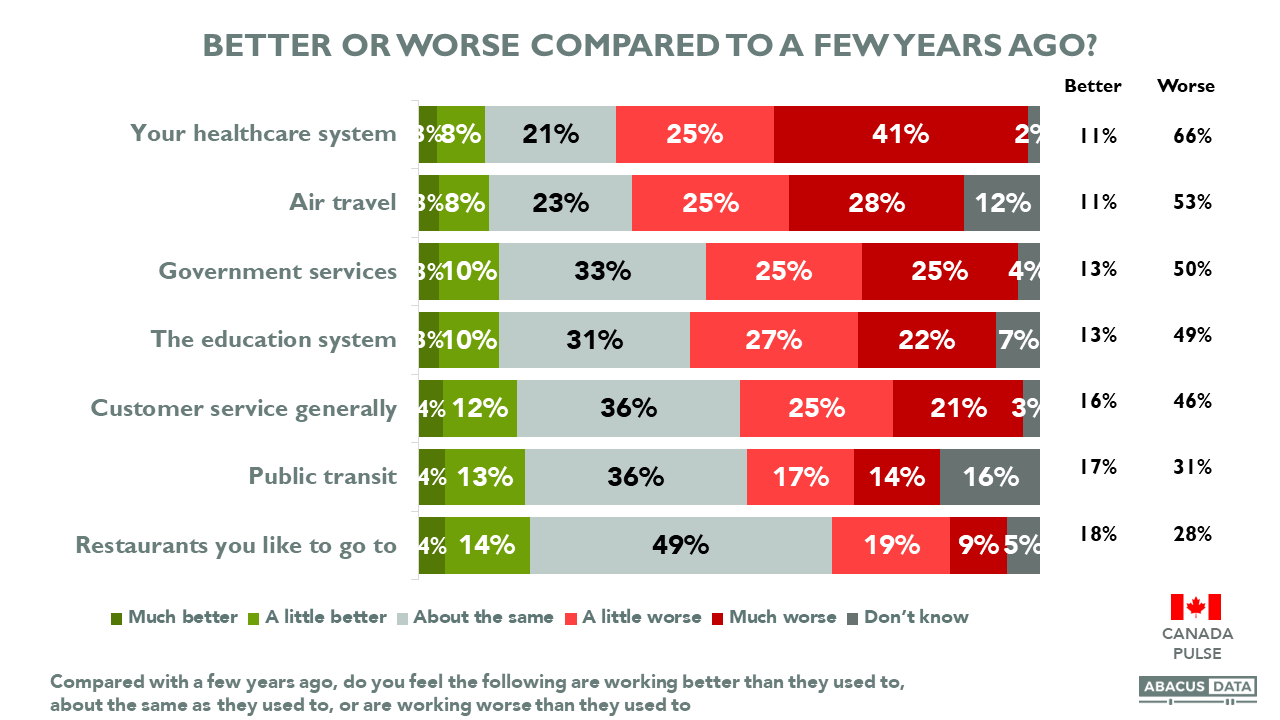Some Perspective and Deeper Polling Analysis on the “Canada Feels Broken” Framing
The whole “Canada feels broken” framing and the ensuing debate had us wondering whether Canadians are so down on the state of their country and whether there was any nuance on the subject. Luckily, David owns a polling firm and so we could dig a bit deeper into public attitudes about the subject.
Our hypothesis is that while many Canadians feel that Canada is broken, not all of them who do, blame government decisions for the state of the world. Why? We have just lived through an almost three-year global pandemic. Putin invaded Ukraine a year ago, causing energy and food prices to spike. The shortage economy – gripping most parts of the world – defined by supply chain shortages, a tight labour market, and general burnout among many workers is making life harder.
So we wanted to explore how Canadians are feeling in more depth, building off the work that Oksana and David did looking at the consumer mindset in Canada a few weeks ago.
A few questions we wanted to answer include:
- Do Canadians think Canada has a good reputation globally? Would they rather live in Canada than elsewhere at the moment?
- What are the specific pain points in the system that are causing Canadians anxiety?
- Do people feel what’s broken is being caused by global factors or government decisions?
- Do Canadians think Canada is better off or worse off than countries similar to it?
We just finished a national survey of 4,000 Canadian adults on Saturday, conducted online with a representative sample. In it, we dug a bit deeper into the whole “Canada feels broken” feeling.
We find that the analysis of public opinion right now is far more complicated and nuanced than the analysis about it has been so far.
Here’s what we found:
More Canadians are dissatisfied with how things are going in Canada. 1 in 3 Canadians is satisfied with the way things are going in Canada. 47% are dissatisfied. Few are very satisfied. This isn’t much different than the right direction/wrong track question pollsters (including us) often ask. People are feeling unhappy, grumpy, and anxious about the world. Whether it’s inflation, rising interest rates, a healthcare system in crisis, or a general sense that good customer service – from government to restaurants – is harder to come by these days.
Those in the Prairies and Conservatives are more dissatisfied, federal Liberal supporters far less so. Of note, Quebecers are the least likely to say they are dissatisfied with how things are going in Canada. Interestingly, younger Canadians more positive about Canada than older Canadians.
Canadians agree that a lot in Canada feels broken, but they also agree they wouldn’t want to live anywhere else. Using experimental design (splitting the sample randomly), Canadians were asked to evaluate how three of six statements.
Large majorities agree Canada deserves to have a great reputation and Canada has a great reputation globally and 70% would rather live in Canada than any other country in the world. The public has a positive assessment of our brand despite their satisfaction level.
At the same time, 65% agree “it feels like so many things in Canada are broken” and almost as many (60%) think that things that they used to expect to work in my life are not working as well as they used to.
So, things feel broken, but Canada is still the best place to be. Half even think that “given the state of the world today, things in Canada are going pretty well.” In other words, sure the world is messed up. We are in a state of permacrisis. Some of what is not working here is a global problem.
A reminder: 65% of Canadians feel things are broken but 49% also agree that comparatively speaking, things in Canada are going ok.
What is causing friction? A lot of things.
Certainly, healthcare – 66% say it’s worse today than a few years ago. About half think air travel, government services, the education system, and customer service generally are worse today than a few years ago. In short, about half think everything isn’t going that well.
However, and this is important nuance, except for healthcare, only about 1 in 4 think those things have gotten much worse. That difference in intensity is important.
Who’s to blame?
This is a critical question – especially when trying to understand the political implications. Do Canadians think government decisions are to blame or are making things worse for Canadians?
When we look at the percentage of Canadians who agree things in their life that they usually can count on aren’t working well, almost as many blame global factors (49%) as government decisions (51%). Of course, not everyone thinks things aren’t working well. When we put the two questions together, here’s what we get…
- 40% think things are working as well.
- 28% think things aren’t as good and it’s because of global factors.
- 32% think things aren’t as good, and it’s because of government decisions.
In other words, only about 1 in 3 Canadians feel things aren’t working and say its the government’s fault. The rest either are ok with how things are in their life or think their life is being messed up by global factors impacting everyone, everywhere.
But the political implications are important and our data suggest that if the “Canada feels broken” framing spreads, it could help the Conservatives and further harm the incumbent Liberals.
When we compare current vote intention across these three groups, we find the Liberals lead among the “global factors make my life crap” group and the “things are fine or better” group. Conservatives lead big among the “government decisions make my life crap” group.
So far though, most Canadians don’t feel that way. Yes, many feel things aren’t like they used to be – healthcare, customer service, etc. – but they aren’t universally blaming government decisions for it.
(BTW – For a full update on Canada’s political environment, visit our latest poll analysis released yesterday)
Do Canadians think Canada is better off or worse off than other comparable countries?
In many areas, half or so think worse off. But in every area – from interest rates, to economic growth, to the healthcare system – about half or more think Canada is doing better or as well as countries like Germany, France, or Japan. Most Canadians have perspective on the challenges we face and don’t think we are alone in facing them.
Once again – focus on those who say, “Canada is doing much worse than other countries”. They are the most aggrieved and upset. When we segment them out – they represent about 12% of the population or about 3.6 million people.
This group doesn’t like the federal Liberals. 72% strongly disapprove of the federal government’s performance. 70% really don’t like Justin Trudeau and only 9% of them voted Liberal in 2021 (47% voted Conservative, 10% voted People’s Party, and 19% say they didn’t vote at all). In all honesty, they probably would say Canada is broken, even if it wasn’t facing the challenges it is, because they don’t like the party or people in power.
What does all this mean?
These are certainly tough times for many people. Inflation and rising interest rates are squeezing household budgets. The healthcare system feels deeply unreliable and there’s a growing fear that social order is under threat. A lot of people are upset.
But we don’t think this data presents a picture of a population raging against the machine. Does it to you?
A lot of what we have come to expect to work consistently, does feel broken. The worse of the pandemic may be past us but in its wake, we have a shortage economy (supply chain and labour shortages), a pervasive feeling of burnout, and a very tight labour market. With a potential recession on the horizon, most people get that things are tough but they don’t necessarily think governments have caused the problem.
They do, however, expect them to try and solve the problems and that’s where the federal government has fallen short. There simply isn’t enough empathy and consistent communication about what they are doing to make things better.
Upshot
 David’s take: Canada is a great place to live. And Canadians know and feel that. But they are not naive nor uncritical. That realism can help fuel real discussions about how to fix our problems. The feeling that Canada is ‘broken’ has, however, seeped into the public discourse and risks focusing us on our emotional reactions, not the real problems.
David’s take: Canada is a great place to live. And Canadians know and feel that. But they are not naive nor uncritical. That realism can help fuel real discussions about how to fix our problems. The feeling that Canada is ‘broken’ has, however, seeped into the public discourse and risks focusing us on our emotional reactions, not the real problems.
 Richard’s take: Canada is not immune from populism and it is hard not to worry that there is a deep seated potential for Canadians to get caught up in the Canada is broken narrative. While only a minority currently blame government, that minority has the potential to reshape the electoral map and party system in the forthcoming elections.
Richard’s take: Canada is not immune from populism and it is hard not to worry that there is a deep seated potential for Canadians to get caught up in the Canada is broken narrative. While only a minority currently blame government, that minority has the potential to reshape the electoral map and party system in the forthcoming elections.
Methodology
The survey was conducted with 4,000 Canadian adults from February 9 to 18, 2023. A random sample of panelists were invited to complete the survey from a set of partner panels based on the Lucid exchange platform. These partners are typically double opt-in survey panels, blended to manage out potential skews in the data from a single source.
The margin of error for a comparable probability-based random sample of the same size is +/- 1.6%, 19 times out of 20.
The data were weighted according to census data to ensure that the sample matched Canada’s population according to age, gender, educational attainment, and region. Totals may not add up to 100 due to rounding.
This survey was paid for by Abacus Data Inc.
Abacus Data follows the CRIC Public Opinion Research Standards and Disclosure Requirements that can be found here: https://canadianresearchinsightscouncil.ca/standards/
ABOUT ABACUS DATA
We are the only research and strategy firm that helps organizations respond to the disruptive risks and opportunities in a world where demographics and technology are changing more quickly than ever.
We are an innovative, fast-growing public opinion and marketing research consultancy. We use the latest technology, sound science, and deep experience to generate top-flight research-based advice to our clients. We offer global research capacity with a strong focus on customer service, attention to detail, and exceptional value.
We were one of the most accurate pollsters conducting research during the 2021 Canadian election following up on our outstanding record in 2019.
Contact us with any questions.
Find out more about how we can help your organization by downloading our corporate profile and service offering.






